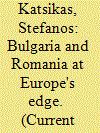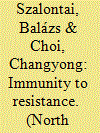| Srl | Item |
| 1 |
ID:
129210


|
|
|
|
|
| Publication |
2014.
|
| Summary/Abstract |
Bulgaria and Romania joined the European Union as full member states on January 1, 2007. This momentous event was the culmination of a long and demanding political project that has often been described as "Europeanization." Although the foundations of this project were laid fairly soon after the fall of both countries' communist regimes in 1989, the pace was slow, and did not really gain momentum
until the end of the 1990s. Over the years the project ebbed and flowed, but what kept both nations committed was their strong belief that joining the EU would fill the political, economic, and security vacuum that the dissolution of the communist bloc had produced. EU membership was popularly seen as a panacea that would allow Bulgaria and Romania to stabilize their newborn democratic systems and overcome the economic problems of the postcommunist transition. It offered confirmation that the Bulgarians and Romanians were really Europeans. Seven years later, however, rather than feeling pulled into the heart of Europe, Bulgaria and Romania find themselves at the edge. Their EU partners raise questions about their commitment to the rule of law and their willingness to crack down on organized crime and illegal immigration. Does this mean that membership has not been an easy route to democratic stability, economic growth, and greater opportunity for all? European integration may be a difficult topic at a time when economic crisis has, for some, cast the entire effort into doubt. But the situation of Romania and Bulgaria lends itself to reflection on the wider project and its overall historical importance.
|
|
|
|
|
|
|
|
|
|
|
|
|
|
|
|
| 2 |
ID:
130550


|
|
|
|
|
| Publication |
2014.
|
| Summary/Abstract |
Purpose-This article investigates whether certain social and subnational groups that have shown resistance against other one-party states might play a similar role in North Korea.
Design/methodology/approach-Comparing the DPRK with various Communist regimes and Baathist party-states in Syria and Iraq, this article examines the following social groups as potential factors of resistance: industrial workers, private entrepreneurs, and religious, ethnic and regional identities.
Findings-Resistance has not been wholly absent in North Korean, but the disaffected social groups have lacked sufficient bargaining power, while the state has occasionally refrained from steps that triggered protests in other countries.
Practical implications-By comparing the DPRK with various types of regimes (pre-reform Communist systems, partially market-oriented Communist systems, and Baathist party-states), the article also seeks to investigate whether the dynamics of North Korean society is largely unique, or if it can be at least partially explained by means of analogy.
|
|
|
|
|
|
|
|
|
|
|
|
|
|
|
|
| 3 |
ID:
086889


|
|
|
|
|
| Publication |
2009.
|
| Summary/Abstract |
With the unraveling of capitalism's neo-liberal variant in 2008-09, the global order appears to be undergoing a transformation as profound as the one that started with the fall of the Berlin Wall and continued with the communist bloc's collapse.
|
|
|
|
|
|
|
|
|
|
|
|
|
|
|
|